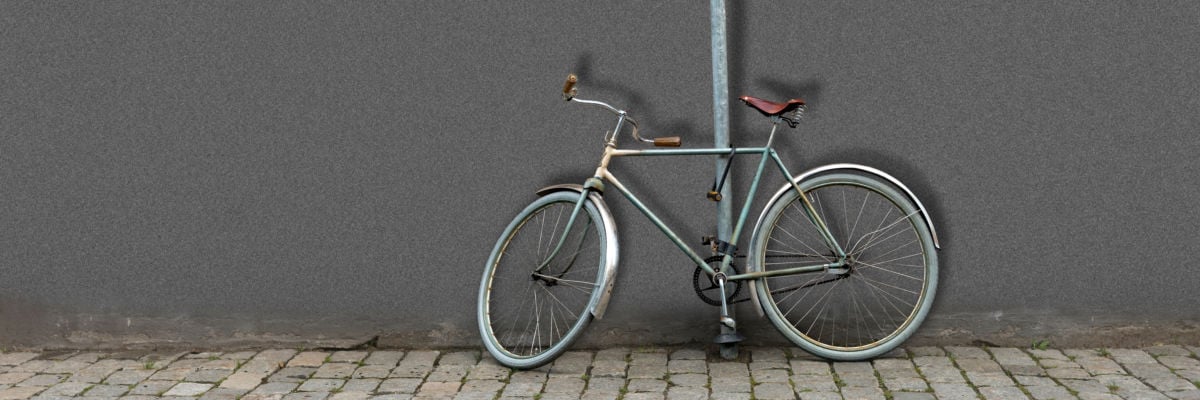
Movies can express Catholic values. I concede that the state of modern filmmaking seems to invalidate that thesis, but broader movie history shows that it’s on the money.
Let’s explore a basic moral principle: “Thou shalt not steal.” Honesty and theft have often been featured in film, and we’ll look at several classic films that illustrate those themes, expanding on them from the perspective of Christian morality. We’ll start with Vittorio De Sica’s 1949 Italian film, Bicycle Thieves.
Set in postwar Rome, Bicycle Thieves is about a poor father, Antonio, whose bicycle is stolen. The bicycle is vital to him because without it, he will be unemployed. With it, he can hold a relatively secure and well-paying job, cycling around Rome to mount posters on walls about movies, shows, and other events.
We meet Antonio outside an unemployment office. An official has come out and called for him, offering him the job on condition he has a bicycle. He currently doesn’t because he pawned his to get money for his family, but he assures the official that he’ll have one and takes the referral.
When he gets home, uncertain of what he will do, he tells his wife, Maria, who resolutely strips the beds of the fine sheets she brought in her dowry (“we can sleep without sheets”) and goes with Antonio to the pawn shop. There, she pawns the linens for cash to get the bicycle back.
The next morning, confident of his future, the happy father drops his boy, Bruno (who’d been polishing the bicycle) by bike at school, then reports to work. During the course of that first day, as he is on a ladder pasting up a poster, a young man who had been tracking him runs up, seizes the bicycle, and rides off, fleeing Antonio’s pursuit.
Antonio goes to the police, who, apart from taking his report, admit they can probably do nothing. Desperate, Antonio turns to some of his friends, who promise to accompany him the next day to some of the bicycle markets around the city to find what they suspect is Antonio’s 1935 Fides stripped down for parts. Bicycles are premium items amid the dislocations of the postwar Italian capital.
The rest of the film details the day that Antonio and Bruno spend scouring Rome for the bicycle, chasing down dead ends, being stuck in a drenching rain, finally recognizing the bicycle thief talking with a confederate. He again escapes, but Antonio extracts his address from the partner. Confronted where he lives, the young punk feigns a seizure while the people of the neighborhood rally around their lad. The policeman admits that Antonio’s case is weak, and the missing bicycle is not in the apartment, so a hopeless Antonio and Bruno escape an ugly mob.
In the final scene outside a soccer stadium Antonio—badly wanting to keep the job that can change his family’s life—spies an unattended bicycle. He tells Bruno to take the tram home. Unbeknownst to him, the little boy can’t cram himself into the overloaded streetcar, and so he sees his father ride off on the stolen bicycle, pursued by a local crowd, which captures him. The bicycle owner and his friends intend to take him to the local precinct but relent when they see the boy, in tears, next to his father. The movie ends with father and son walking off.
Antonio tries to do the right things. He wants to work. The scene in front of the unemployment office is different from today’s workplace ambivalence, where, post-COVID, men of prime working age have “opted out” of the market. Antonio knows he is a family man and his family’s provider, and he’s proud that opportunity seems to have smiled on him in a good position.
And it all comes crashing down because of a thief.
Catholic moral theology recognizes that theft is wrong, but its gravity can be affected by the victim’s need. That cuts two ways: it is more sinful to steal from a poor man than a rich man because the theft affects the former more direly, and a person has a right to certain goods to survive. Those goods might not include a bicycle, but they do include food.
Catholic social thought defends private property, precisely because a certain share of the world’s goods is essential for a person to be free economically, including to be able to provide for his family (see Rerum Novarum 8-15). Antonio’s right to his bicycle, precisely because of its centrality to his ability to provide a better life for his family, makes its theft all the graver.
But Antonio has a right to his bicycle, not a bicycle, and certainly not someone else’s bicycle. His theft of another man’s bicycle is, objectively, wrong, though his subjective culpability may perhaps be mitigated by the fear that haunts him for his family’s future. We leave that to God. There is a reason the original film title is “The Bicycle Thieves”—not, as mistranslated into English, “The Bicycle Thief.”
What is perhaps even the greater sin is not just the theft, but what it does to Antonio. As Karol Wojtyła stressed, human actions have two effects: they get things done externally (a bicycle is stolen in the world), and they change me internally (I become a thief). In this case, the theft also contributes, indirectly, to Antonio’s becoming a thief. Antonio crosses the line Plato warned Gorgias against: it is better to suffer evil than do it, because the former remains outside me, and the latter does not.
And not only does he become a thief, but he becomes a thief in the eyes of his little boy. What is stolen here is worse than a bicycle—it is the theft of childhood innocence, an example that will remain in that boy’s eyes for a lifetime and may influence his own deeds later in life. Although Antonio is directly responsible for that, Antonio’s bicycle thief shares responsibility. That’s why sin is bigger than the concrete act and why its atonement can never be a simple reversion to the status quo ante. Good and evil leave their effects, as films as diverse as A Christmas Carol and It’s a Wonderful Life show. It’s why man needs a divine Savior to redeem him from sin and reassemble Humpty Dumpty.
Bicycle Thieves shows what liberation theology calls “structures of sin.” The Congregation for the Doctrine of the Faith notes that “structures of sin” are not an excuse to deny personal responsibility. But for all its failings, the concept does show how personal choices expand beyond human capacity to limit them, in some sense taking on a life of their own. It’s why Catholic theology speaks about indulgences—not as “time off from purgatory,” but as a necessary recourse to spiritual resources beyond my own feeble efforts to set right the wrongs my hands, which produced them, cannot.



